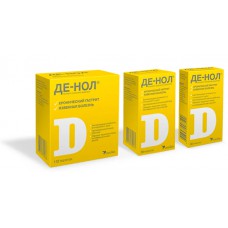Expiration date: 01/2026
Composition and form of release:
Tablets. 1 tablet contains:
bismuth tricalium dicitrate 304, 6 mg
(in terms of bismuth oxide Bi2O3 — 120 mg)
excipients: corn starch povidone K30 potassium polyacrylate macrogol 6000 magnesium stearate
shell: Opadry OY-S-7366 (hypromellose, macrogol 6000)
in the blister 8 PCs. there are 7 or 14 blisters in a box.
Description of the dosage form:
Round, biconvex coated tablets, cream-white in color, with the inscription "gbr 152" stamped on one side, and a graphic drawing in the form of a square with interrupted sides and rounded corners — on the other, odorless or with a slight smell of ammonia.
Characteristics:
Bismuth preparation.
Pharmacokinetics:
Bismuth subcitrate is practically not absorbed from the gastrointestinal tract. It is mainly excreted in the feces. A small amount of bismuth that enters the plasma is excreted from the body by the kidneys.
Description of pharmacological action:
Anti-ulcer agent with bactericidal activity against Helicobacter pylori. It also has an anti-inflammatory and astringent effect. In the acidic environment of the stomach, insoluble bismuth oxychloride and citrate are deposited, chelated compounds are formed with a protein substrate in the form of a protective film on the surface of ulcers and erosions. Increasing the synthesis of PGE, mucus formation and secretion of bicarbonate, stimulates the activity of cytoprotective mechanisms, increases the resistance of the gastrointestinal mucosa to the effects of pepsin, hydrochloric acid, enzymes and bile acid salts. Leads to the accumulation of epidermal growth factor in the defect area. Reduces the activity of pepsin and pepsinogen.
Indications:
- peptic ulcer of the stomach and duodenum in the acute phase, including associated with Helicobacter pylori
- chronic gastritis and gastroduodenitis in the acute phase, including those associated with Helicobacter pylori
- irritable bowel syndrome, which occurs mainly with symptoms of diarrhea
- functional dyspepsia that is not associated with organic diseases of the gastrointestinal tract.
Contraindications:
- individual intolerance to the drug
- severe renal impairment
- pregnancy
- breast-feeding period.
Use during pregnancy and lactation:
Contraindicated during pregnancy. Breast-feeding should be stopped during treatment.
Side effect:
From the digestive system: nausea, vomiting, more frequent stools, constipation may occur. These phenomena are not dangerous to health and are temporary.
Allergic reactions: skin rash, itching of the skin.
With long — term use in high doses-encephalopathy associated with the accumulation of bismuth in the Central nervous system.
Drug interaction:
For half an hour before and after taking De-Nol, it is not recommended to use other drugs inside, as well as food and liquid intake, in particular antacids, milk, fruit and fruit juices. This is due to the fact that they can affect the effectiveness of De-Nol when ingested simultaneously.
Dosage and administration:
Inside, with a small amount of water.
Adults and children over 12 years of age — 1 table 4 times a day 30 minutes before meals and at night, or 2 tables. 2 times a day for 30 minutes before meals.
Children from 8 to 12 years — 1 table. 2 times a day for 30 minutes before meals.
Children from 4 to 8 years — at a dose of 8 mg/kg/day, the daily dosage is divided into 2 doses. Take 30 minutes before meals.
The duration of treatment is 4-8 weeks. For the next 8 weeks, do not use drugs containing bismuth.
For the eradication of Helicobacter pylori, it is advisable to use De-Nol in combination with other antibacterial agents that have anti-Helicobacter activity.
Overdose:
Symptoms (with long-term doses exceeding the recommended ones): impaired renal function. These symptoms are completely reversible when De-Nol is discontinued.
Treatment: gastric lavage, administration of activated charcoal and saline laxatives. Further treatment should be symptomatic. In the case of impaired renal function, accompanied by a high level of bismuth in the blood plasma, the use of complexing agents — dimercaptoyantaric and dimercaptopropanesulfonic acids. In the case of severe renal impairment, hemodialysis is indicated.
Special instruction:
The drug should not be used for more than 8 weeks. It is also not recommended to exceed the established daily doses for adults and children during treatment. During treatment with De-Nol, other drugs containing bismuth should not be used. At the end of the course of treatment with the drug in the recommended doses, the concentration of the active active substance in the blood plasma does not exceed 3-58 mcg/l, and intoxication is observed only at concentrations above 100 mcg/l.
When using De-Nol, it is possible to stain feces in a dark color due to the formation of bismuth sulfide. Sometimes there is a slight darkening of the tongue.





